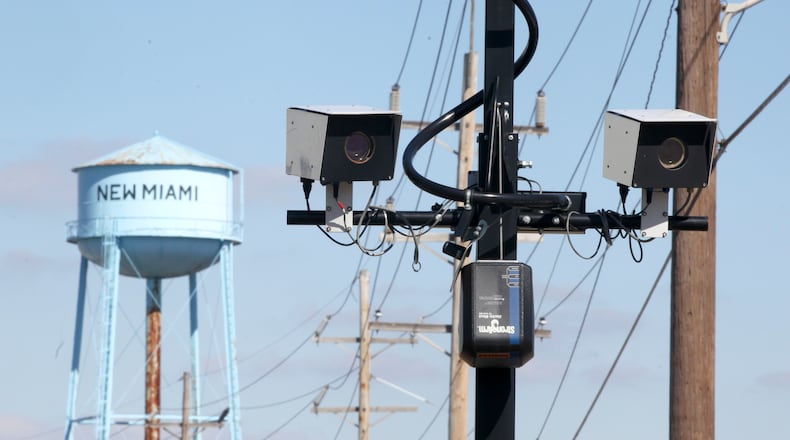The two sides in the case with a potential payout to speeders argued for about three hours before Butler County Common Pleas Judge Michael Oster. The sole issue was the financial watchdog, but Oster scheduled another hearing for this week, when he will announce his watchdog decision and consider some other issues.
Anthony Raluy, one of the attorneys for the village, said there is no evidence the village has been lavishly spending and appointing a financial watchdog is not only unnecessary but would send the court down a slippery slope.
“It’s the bedrock of American government, the separation of powers, the judiciary, the legislative and the executive,” Raluy said. “The problem is, appointing a receiver, under Ohio law you’re charged with responsibility over the receiver. At that point the judiciary is starting to invade the province of the legislative branch. The village is the one that makes the appropriations and they make the appropriations consistent with what they think the voters want them to do.”
Oster acknowledged the plaintiffs are asking him to do something that has never been done before — deem a municipality a “corporation” for the purpose of appointing a “receiver” — and he said he also fears the separation of powers would become murky at best.
“So I am the mayor of New Miami,” Oster said when speeders’ attorney Josh Engel suggested the judge can force the village to do whatever plan — including taking out loans or even dissolving the village — a watchdog might come up with to satisfy any future judgment.
Engel replied the powers of the watchdog could be narrowly drawn so as not to overstep the local government’s power, but a watchdog is required because the village has refused to take any steps to set aside funding for a judgment that will likely be well in excess of $3 million.
He said the village should be setting aside funds from the new speed camera program — that has been operating since the beginning of 2016. Records show the new speed monitoring system has brought in almost $1.2 million, of which $783,969 went into village coffers. The rest goes to the third-party vendor that manages the program.
“They have not done any kind of planning to say how they are going to comply if the court orders a $3.3 or $3.7 million restitution order, how they are going to comply with that…,” Engel said. “That’s irresponsible. If you know that the court is going to tell you to do something, you anticipate and you take action to make sure you comply with the court’s order.”
MORE: New Miami revved up spending with speed camera revenue
New Miami Fiscal Officer Belinda Ricketts took the stand earlier and confirmed the village does not currently have funds to satisfy a potential $3 million-plus judgment — the total cash they have right now is $1.7 million in their checking account and $535,000 in a money market account.
As for spending, she said they have a bare-bones budget. Raluy asked her if the village has had “any extraordinary expenditures” since they first installed the speed cameras.
“We replaced a couple roofs, we paved some parking lots, we bought two used street plow trucks because our old ones, when they plowed the roads they had to have an umbrella inside the cab because the roof was rusted out, and if they lifted the bed too much it fell off to the side and they had to put it back,” she said. “So we have spent some money.”
A Journal-News investigation from 2014 differs from Rickett’s recollection.
The village spent nearly $210,000 in 2013 — the only time the cameras were rolling all year — on new cars, trucks and equipment for vehicles, including two 2013 Dodge Chargers for the police department, a 2013 Dodge Ram for the police, a snow plow and a 2014 Ford F- 250 truck for the street department, according to documents obtained by the Journal-News.
Raises were also given to some employees. A full-time staffer was also hired to help enforce the village’s housing codes, and five employees received $8,000 in reimbursements for out-of-pocket health insurance premiums, under the village’s plan, during 2012.
Overall, expenditures in the village’s general fund increased by roughly $430,000 from 2012 to 2013, according to the documents.
When asked about the discrepancy between the village documents from back then and Ricketts’ testimony, Raluy said she told him she was only thinking about “extraordinary” spending in terms of capital items like roofs and parking lots, not salaries or necessarily vehicles when she took the stand.
A recent study into village expenditures by this news agency showed the village has been rather frugal.
State audit reports show ending general fund cash balances for the village were at a high of $1.66 million in 2013 and have remained in the $1.3 million range since. Spending out of the general fund has remained pretty constant as well. It dipped about $100,000 in 2014, dropped down to $538,065 the next year.
Since the lawsuit started the village has paid $319,604 — through June — for attorneys fees. This type of litigation is not covered by insurance.
Raluy told Oster the village will appeal immediately if he appoints a receiver.
This week Oster will listen to the two sides on the issues of new higher court decisions that could call into the question whether the village’s old speed camera program violated due process rights, the village’s request to pay a potential judgment over ten years and prejudgment interest the speeders want.
About the Author
